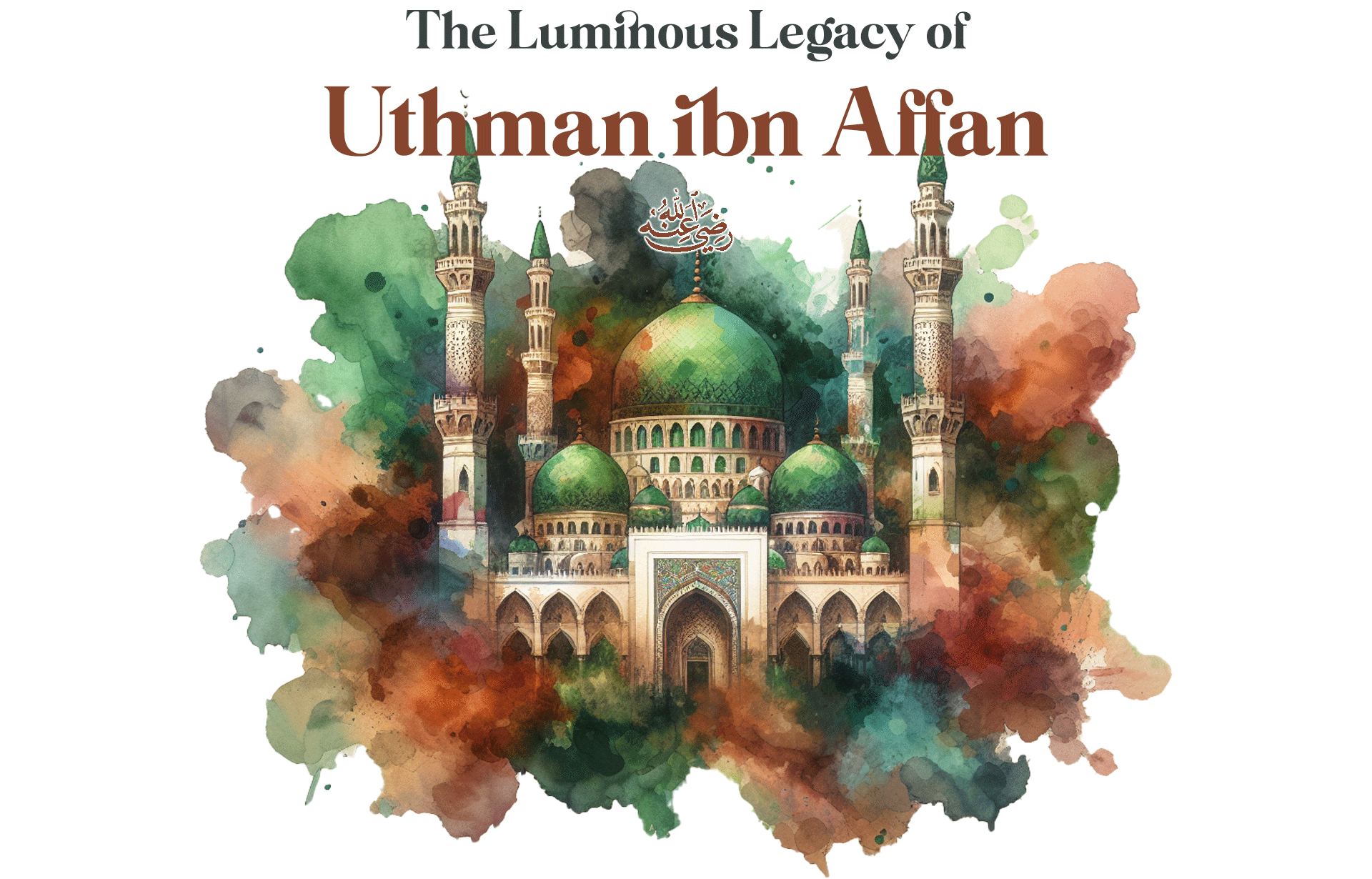Hazrat Usman ibn Affan (RA): The Generous Caliph of Islam
Hazrat Usman ibn Affan (RA), the third Caliph of Islam, holds a highly respected place in Islamic history. Known for his piety, humility, and generosity, he played a pivotal role in the expansion of the Islamic state and in preserving the Holy Qur’an in its written form. His life remains a shining example of devotion, leadership, and sacrifice.
Early Life and Conversion to Islam
Born in 576 CE in Makkah, Hazrat Usman (RA) belonged to the noble Umayyad clan of the powerful Quraish tribe. His father was Affan ibn Abi al-As, and his mother Arwa bint Kurayz was a relative of the Prophet Muhammad (PBUH). Even before embracing Islam, he was known for his integrity, wisdom, and success as a businessman.
Hazrat Usman (RA) accepted Islam through the efforts of his close friend, Hazrat Abu Bakr (RA), making him one of the early converts. His conversion carried great significance due to his high social status and influence in Makkah. After embracing Islam, he fully dedicated his life to supporting the Prophet Muhammad (PBUH) and strengthening the Muslim community.
Marriage to the Prophet’s Daughters
One of the unique honors granted to Hazrat Usman (RA) was his marriage to two daughters of the Prophet Muhammad (PBUH), one after another. He first married Ruqayyah (RA), and after her death, married Umm Kulthum (RA). Because of this rare distinction, he earned the title Dhun-Nurayn, meaning “The Possessor of Two Lights.” This honor reflected the deep trust and affection the Prophet (PBUH) had for him.
A Legacy of Generosity
Hazrat Usman (RA) was renowned for his incredible generosity. He spent freely from his wealth for the betterment of the Muslim community. One of his most notable contributions was purchasing the well of Rumah in Madinah and donating it for public use after Muslims faced a severe water shortage.
During the expedition of Tabuk, when the Prophet (PBUH) called on Muslims to support the army, Hazrat Usman (RA) rose to the occasion. He equipped 300 soldiers and donated 1000 gold dinars. This act of generosity led the Prophet (PBUH) to declare, “After today, nothing will harm Usman no matter what he does.”
He also funded the expansion of Masjid al-Nabawi in Madinah, allowing more space for the growing number of Muslims to worship. His commitment to Islam set a lasting standard for charitable giving and selfless service.
His Caliphate and Major Achievements
Hazrat Usman (RA) became the third Caliph of Islam in 644 CE, following the martyrdom of Hazrat Umar ibn al-Khattab (RA). His caliphate lasted 12 years—the longest among the Khulafa-e-Rashideen. The early years of his reign were marked by peace, prosperity, and significant territorial expansion.
Under his leadership, Islamic forces achieved victories in regions such as North Africa, Armenia, Cyprus, and parts of Persia. He delegated authority to regional governors, ensuring effective administration across the growing empire.
Compilation of the Holy Qur’an
One of Hazrat Usman's (RA) most vital and lasting contributions was the compilation of the Qur’an into a single, standardized version. As Islam spread to various regions, variations in recitation appeared. On the advice of companions like Hudhayfah ibn al-Yaman, Hazrat Usman (RA) took the initiative to preserve the Qur’an in its original dialect.
He appointed a committee led by Hazrat Zaid ibn Thabit (RA) to compile the text. Multiple identical copies were made and distributed to key Islamic cities. All other versions were destroyed to eliminate confusion and ensure unity in Qur’anic recitation. This effort protected the integrity of the Holy Qur’an for future generations.
Challenges and Martyrdom
Despite his numerous achievements, the latter part of Hazrat Usman’s (RA) rule was fraught with internal unrest. Accusations of nepotism and dissatisfaction with some of his appointed governors stirred opposition. While many of these claims were either exaggerated or false, they were used by political agitators to incite rebellion.
A man of peace, Hazrat Usman (RA) refused to use force against the rebels. He was determined to avoid bloodshed among Muslims, even when his house in Madinah was surrounded. His companions wished to defend him, but he forbade any violence.
In 656 CE, while reciting the Qur’an in his home, Hazrat Usman (RA) was martyred by rebels. His tragic death marked the end of a peaceful era and the beginning of political turmoil in the Muslim world.
Lasting Legacy
Hazrat Usman ibn Affan (RA) left behind a legacy defined by faith, generosity, and leadership. Though he had immense wealth, he lived a humble and simple life, always prioritizing the needs of the Muslim Ummah. His preservation of the Qur’an is one of his greatest contributions to Islam, securing the text for all generations.
He is remembered with love and reverence as one of the Khulafa-e-Rashideen and remains an inspiring figure for Muslims around the world. His life reminds us of the importance of selflessness, justice, and unwavering devotion to Allah.



0 Comments